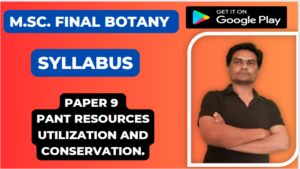![]()
Paper 8 Plant Ecology
Unit 1
Science of Ecology: Introduction to ecology, evolutionary ecology, ecological models;
Population Characteristics of population, population size and exponential growth limits of population growth population dynamics, life history pattern, fertility rate and age structure Population growth Competition and coexistence, intra- specific interactions, interspecific interaction, scramble and contest competition model, mutualism, commensalism and allelopathy, prey-predator interactions.
Vegetaion organization; Concepts of community and continum community coefficients, interspecfic associations, ordination, speces diversity and pattern diversity in community, concept of habitat and cotone ecological niche.
Unit 2
Vegetation development; Temporal changes (cyclic and non cyclic) mechanism of ecological succession (relay floristic and initial floristic composition),succession models (facilitation tolerance and inhibition models), changes in ecosystem properties during succession concept of climax
Ecosystem: Nature and size of ecosystem, components of and ecosystem (producers, consumers and decomposers), Grazing (grassland) and Detritus food chain in freshwater ecosystems, food webs, ecological energetic. Solar radiation and energy intakes at the earth’s surface, energy flow models, Productivity of various ecosystems of the world and global biogeochemical cycles of carbon and nitrogen, ecosystem services.
Unit 3
Ecosystem stability : Concept (resistance and resilence), ecological perturbations (natural and anthropogenic) and their impact on plant and ecosystems, Restoration of degraded ecosystems, ecology of plant invasion, Environment impact assessment, ecosystem restoration.
Biomes, Biodiversity; Major biomes of the world and impact of changing climate on biomes. Biodiversity Concept & level role of biodiversity in ecosystem function and stability, assessment (local national and global), speciation and extinction, Biodiversity act of india and related international conventions, diversity indices, IUCN categories of threat, Hot spots.
Unit 4
Conservation; Conservation (ex situ and in situ) and management, International Conservational organizations, sustainable development, natural resource management in changing environment, molecular ecology, genetic analysis of single and multiple population, molecular approach to behavioural ecology, conservation genetics.
Energy ; Sources, fossil fuels, nuclear fuel, Solar energy , Fuel cells, Biomass, Hydropower, Wind Power, Geothermal, Tidal & Wave energy, Energy conservation.



